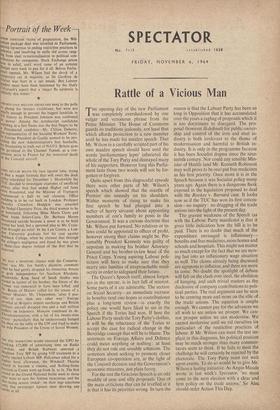Rattle of a Vicious Man
THE opening day of the new Parliament was completely overshadowed by one vulgar and venomous phrase from the Prime Minister. The House of Commons guards its traditions jealously, not least that which affords protection to a new member until he has made his maiden speech. That Mr. Wilson in a carefully scripted part of his own maiden speech should have used the words 'parliamentary leper' infuriated the whole of the Tory Party and dismayed many of his supporters. However long this Parlia- ment lasts those two words will not be for- gotten or forgiven.
Quite apart from this disgraceful episode there were other parts of Mr. Wilson's speech which showed that the mantle of Premier sits uneasily on his shoulders. Within moments of rising to make his first speech he had plunged into a welter of heavy sarcasm about appointing members of one's family to posts in the Government. It was a curious doctrine that Mr. Wilson put forward. No relatives or in- laws could be appointed to offices of profit, however strong their claims might be. Pre- sumably President Kennedy was guilty of nepotism in making his brother Attorney- General and his brother-in-law head of the Peace Corps. Young aspiring Labour poli- ticians will have to make sure that they marry into families of irreproachable medi- ocrity in order to safeguard their future.
The Queen's Speech itself, almost forgot- ten in the uproar, is in fact full of interest. Some parts of it are admirable. The section on Social Security—an immediate increase in benefits (and one hopes in contributions) plus a long-term review—is exactly the policy one would have liked to see in the Speech if the Tories had won. If here the Labour Party steals the Tory Party's clothes, it will be the reluctance of the Tories to accept the case for radical change in the Beveridge concept that will be to blame. The sentences on Foreign Affairs and Defence could mean anything or nothing : .at least they do not rule out sensible solutions. The sentences about seeking to promote closer European co-operation are, in the light of the Concord decision and the Government's economic measures, just plain funny.
For the rest the Gracious Speech is an odd muddle of sane and silly proposals. One of the main critic:isms that can be levelled at it is that it has its priorities wrong. In turn the reason is that the Labour Party has been so long in Opposition that it has accumulated over the years a ragbag of proposals which it is too doctrinaire to disregard. The pro- posal (however ill-defined) for public owner- ship and control of the iron and steel in- dustry is both irrelevant' to the theme of modernisation and harmful to British in- dustry. It is only in the programme because it has been Socialist dogma since the nine- teenth century. Nor could any sensible Min- ister of Health (and Mr. Kenneth Robinson may well prove to be one) put free medicines as his first priority. Once more it is in the Speech because it was Socialist policy many years ago. Again there is a dangerous flank exposed in the legislation proposed to deal with the Rookes v. Barnard case. It looks now as if the TUC has won its first conces- sion—no inquiry : no dragging of the trade unions into the light of the present day.
The gravest weakness of the Speech (as with the Labour Party manifesto) is that it gives little indication how the bill is to be paid. There is no doubt that much of the expenditure envisaged is inflationary— benefits and free medicines, more homes and schools and hospitals. This might not matter so much except for the fact that we are mov- ing fast into an inflationary wage situation as well. The claims already being discussed are signposts to inflation, and there are more to come. No doubt the spotlight of debate will fall on the clash over steel, the abolition of banging, and such trivial matters as the disclosure of company contributions to poli- tical parties. The real argument can be seen to be centring more and more on the role of the trade unions. The equation is simple enough. We cannot pay for the advances we all wish to see unless we prosper. We can- not prosper unless we can modernise. We cannot modernise until we rid ourselves (in particular) of the restrictive practices of labour. If Mr. Wilson can meet the test im- plicit in this diagnosis, his political position may be much stronger than many commen- tators seem to think. If he fails to meet the challenge he will certainly be rejected by the electorate. The Tory Party must not wait upon events. To do so would be to give Mr: Wilson a lasting initiative. As Angus Maude wrote in last week's Spectator, 'we must come to the next election with a clear and firm policy on the trade unions.' Sir Alec should order Action This Day.
































 Previous page
Previous page